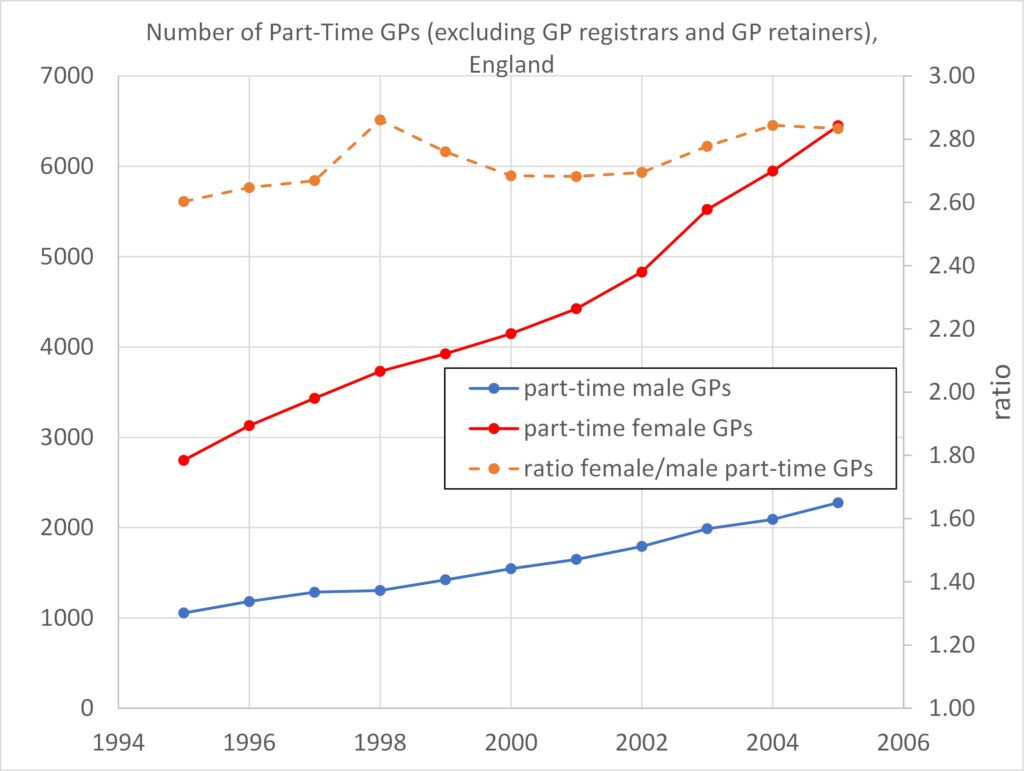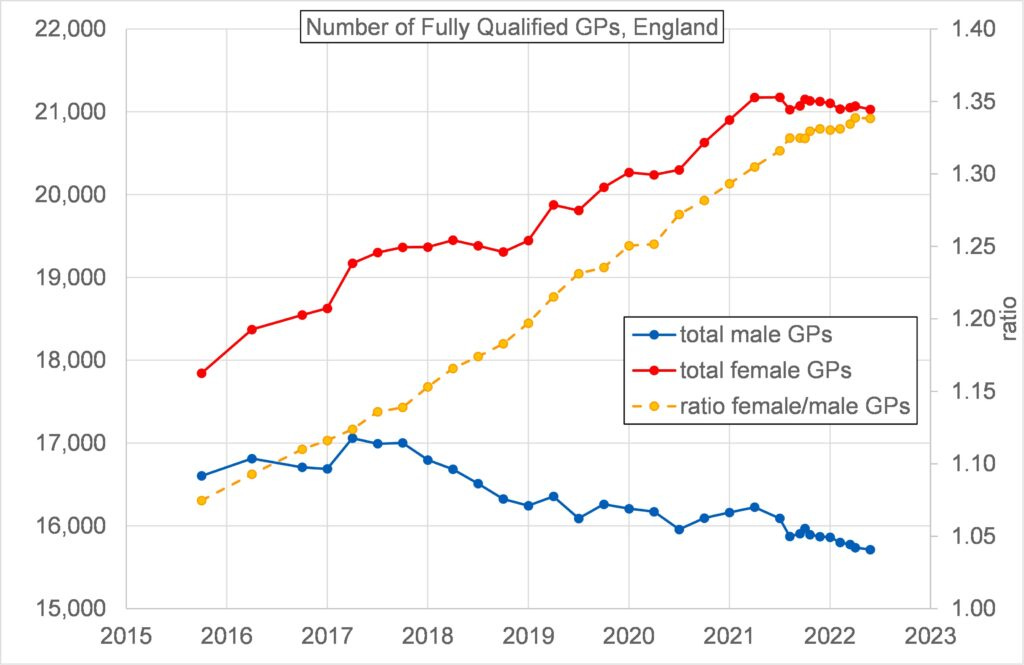Most people in the UK are having trouble getting doctor’s appointments and elective surgery. Ambulances are taking double the time they used to take. The mentally ill are roaming the streets. The National Health Service is in meltdown:
Source: Economist
What is going wrong?
Water companies are spilling sewage into rivers and seas because there is no monitoring, asylum cases are taking months and even years to be heard. Electric Vehicle owners are being fined £80 for non-payment of £0 tax. Social workers are simply not available. Farmers are not receiving post EU advice and subsidies. Record numbers of teachers are quitting.
What is happening?
The entire public sector is in meltdown.
The NHS has had a large influx of staff over the past 5 years:
But notice that the staff are “FTE” - Full Time Equivalent.
The big change in the NHS is that 76% of its staff are now women.
A third of female GPs worked part-time in 2015:
Source NHS: General and Personal Medical Services, England and Empathy Gap
The figures above are 17 years out of date and are likely to be considerably higher today given the vast influx of female GPs.
Source: General Practice Workforce and Empathy Gap
I talked to a senior Civil Servant about these issues yesterday. She gave a wry smile and said “there is no clear management or direction” and added “people are making their own lives within the Service and are not committed to any wider goals”.
The proportion of senior civil servants who are women has risen from 18% in 1997 to 47% in 2022. 55% of all civil servants are now female.
There have seldom been more Civil Servants.
Over 30% of female civil servants work part-time.
(Part time working in Civil Service by age group)
Education is also in crisis. The big change in the education sector is that 76% of teachers are now women. 20% of the education workforce is part-time which is close to the national figure for part time working despite the fact that children attend school all day.
Part-time workers will always claim they work twice as hard as full time workers. Perhaps they do. But it is very strange that a massive change in the profile of public sector workers has occurred at the same time as the collapse of the public sector.
The management in the public sector are unable to inspire their workforce: for the managers it is almost as if half the workforce is not present when they try to add inspiration.
Poor management may also be related to the demands on the managers. The stress nowadays in management training is on interpersonal relations and compliance with the Equality Act 2010. The efficiency of an organisation should be measured more in terms of how well it performs in its principle function rather than how well it performs on internal measures. However, in the public sector the staff do not really know the nature of their principle function: to serve the public and the country.
If the problem is not part-time working then is it the huge influx of female workers?
The low wages of female entrepreneurs (average £15k compared with male average £45k) is indicative of a systemic difference between men and women. The British Business Bank article in which female run businesses were compared with male run businesses ascribed the difference in income levels to factors such as access to finance and under representation in senior roles. It also mentioned “systemic differences”. What was conspicuous by its absence was any discussion of the fact that most women are deeply attached to their families. Being an entrepreneur consumes most of your time in the early years, without a single minded focus on the business it is hard to be successful. Only the cleverest and most organised of women will find managing the conflicting demands of home and business easy to manage. Being a part-time entrepreneur is nearly impossible.
Statistics on entrepreneurs expose raw performance at business. However, it is sacrilege to suggest that the same factors may be operating in paid employment in the public sector as in entrepreneurship.
The public sector is increasingly female. In fact the NHS and Teaching have become female occupations. It makes sense to query the female composition of the public sector before such analysis is forbidden by equality legislation. However, what other factors might be causing the failure of the public sector?
The wokery introduced after the Equality Act 2010 cannot help because it diverts management inwards.
The NHS is also appallingly managed. See Why is the NHS Failing.
Another factor is that the senior managers do not seem to be qualified in the technical aspects of their work. The best managers have both managerial and technical experience and they should not have outside appointments and directorships.
The recent Ofwat (water industry regulation) scandal in which senior civil servants were financially connected to the water industry is a good example of conflict of interests. The people who appointed the Ofwat staff were lax at best.
In the recent Post Office Scandal the CEO, Paula Vennels, had dispersed interests when she should have been focussed on the evil she was committing at the Post Office. Astonishingly she was devoting much of her time to attempting to be Bishop of London.
Perhaps Senior Civil Servants should be monitored and, as a requirement for their job, allow their financial affairs to be spot checked to prevent corruption.







